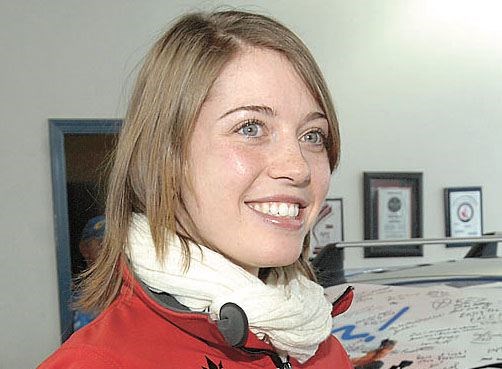Megan Heinicke wasn't sure if a third Winter Olympics was in her future.
But after posting her best-ever World Cup biathlon result when she placed 15th late in the season and finishing up in Sochi with a strong showing in the Olympic relay, her crystal ball is now in focus.
The native of Prince George plans to wear the maple leaf in 2018 in Pyeongchang, South Korea.
"I'm kind of surprised myself, because I wasn't sure two years ago if I wanted to continue that far, but I feel I've come too close to give up," said Heinicke, from her home in Germany.
"I'm still loving it as much as I was before and I still have that passion and drive. 2018, I suspect, will be the end for me but you never know."
Heinicke got off to a disastrous start in her second Olympics two months ago in Sochi. She placed 51st in the individual race and was 59th in the sprint, barely qualifying for the pursuit. A rifle sight obscured by ice during the pursuit led to what she called the worst race of her career. She was unable to see her targets and ended up dropping out after her fourth shooting round.
But on the final weekend of the Olympics, Heinicke teamed up with Megan Imrie, Rosanna Crawford and Zina Kocher on the Canadian women's relay team and came close to winning a medal. Skiing third in the order, Heinicke was flawless in both shooting rounds, nailing 10 targets with 10 bullets with robotic precision. She finished each shooting bout in just 28 seconds and had the team in fourth place when she tagged Kocher, who moved up to second place as she got to the range. But Canada's medal hopes were dashed when Kocher missed twice in her prone shooting, then had three misses while standing and lost count after using all three of her spare bullets, reaching for a fourth spare that never was there. By the time she realized her mistake and skied her two penalty loops, Canada had dropped to ninth, but Kocher made up one critical spot before the finish to place eighth.
"She lost so much time there and it was more of a heartbreak for her than anyone and nobody's sour about it because that's what a team relay is, the whole team pulling it together on one day," said Heinicke. "I think we would have all been more happy to be eighth if we hadn't fallen from second. Our goal was to be in the top six if everyone had a great day, but eighth was still a big step up from the 15th place the same four girls made [at the 2010 Olympics] in Vancouver."
As disappointed as the four Canadian women were to be knocked out of medal contention, their eighth-place result was an all-time Olympic best. By placing eighth, Heinicke qualified for national team funding for the first time since 2009. Sport Canada excludes athletes from funding unless they live and train in Canada at the national team training centre, but that non-resident rule is waived if the athlete achieves a top-eight placing in an Olympic or world championship competition.
"It makes a big difference for me, "said Heinicke, who lives in Altenberg, Germany with her husband Illmar and their 3 1/2-year-old son Predo. "I've missed five years of funding, that's $100,000. That was good news for me."
Illmar, who coached the Caledonia Nordic Ski Club from 2007-09, has been a regional junior team coach in Germany since 2010 and has taken on a new role as head coach of Germany's junior development national team.
"He will be traveling a lot more but my situation basically stays the same, I'll still have a lot of training opportunities and training partners here," Megan said.



